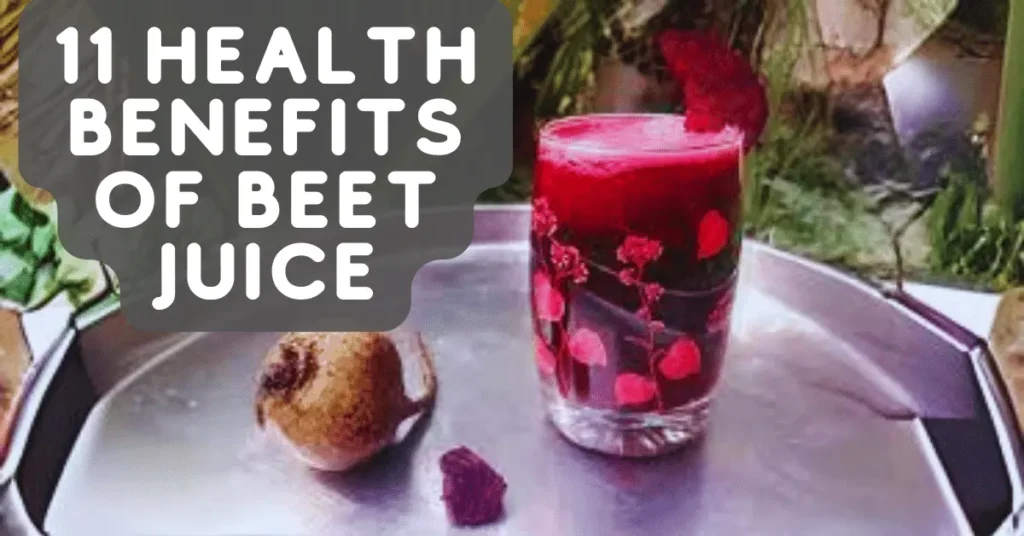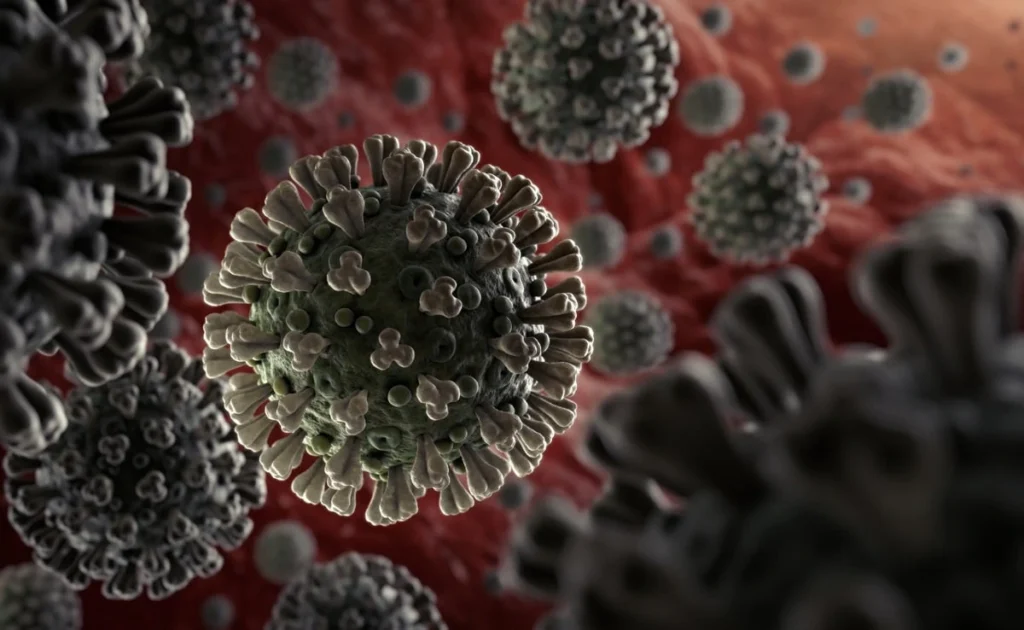Antioxidants, electrolytes, and other substances included in beet juice may promote heart and brain health in addition to other advantages.
Most people either adore or detest the bulbous, sweet root vegetable known as the beetroot. While it’s not quite new, in the last ten years it’s become a superfood.
According to research, consuming beetroot juice, often known as beetroot juice, may be healthy. This is the method.

1. May help lower blood pressure
Drinking beetroot juice could help decrease blood pressure. A meta-analysis for 2022According to a reliable source, beetroot juice nitrate reduced the systolic blood pressure of hypertensive adults.
Beetroot juice contains substances called nitrates, which the body uses to produce nitric oxide, which helps relax and dilate blood vessels.
2. May improve exercise stamina
Beetroot juice consumption may raise plasma nitrate levels and improve athletic performance.
An overview of the literature from 2017According to Trusted Source, consuming beetroot juice for a prolonged period of time (six to seven days) may have the following advantages:
enhancing time trial performance
lengthening the time it takes to become exhausted
enhance one’s cardiorespiratory capacity
Though more research is required, the researchers also pointed out that combining beetroot juice with caffeine may lessen the benefits.
3. May improve muscle power in people with heart failure
The study’s 2016 findingsExercise tolerance in older persons with heart failure may be improved by eating 70 mL (one-third cup) of beetroot juice every day for one week, according to a reliable source.
The participants’ aerobic exercise endurance increased by 24%, according to the study.
4. May help you maintain a healthy weight
Beetroot juice in its purest form has very little fat and few calories. It’s a fantastic choice for your smoothie in the morning. It will provide you with an energy and nutrient boost as you begin your day.
It is high in natural sugars, though.
5. May help reduce your risk of cancer
Antioxidants that are soluble in water called betalains give beets their vibrant colour. Additional flavonoids and polyphenolic chemicals, which may have anti-inflammatory and antioxidant qualities, are also present (Trusted Source).
Antioxidants such as betalains may assist in locating and eliminating unstable molecules or free radicals within the body. These substances, when present in excess, can exacerbate inflammation and raise the risk of cancer.
6. May help support health while on chemotherapy
Additional studyAccording to Trusted Source, beetroot juice may have chemoprotective qualities. This suggests that it might lessen the negative effects of chemotherapy and the harm it does to the body. Fatigue may be one of these.
Nonetheless, the review’s authors point out that more investigation is required, especially to determine whether beetroot juice can interfere with chemotherapy and other drugs.
7. Good source of potassium
Potassium, a mineral and electrolyte that supports healthy nerve and muscle function, may be found in beets. Moderate use of beetroot juice can help maintain healthy potassium levels.
A low potassium level can lead to weakness, exhaustion, and cramping in the muscles. Extremely low potassium levels might cause dangerously irregular heartbeats.
Overly elevated potassium levels can cause similar symptoms and could be fatal.
Before frequently eating beetroot juice, those with end-stage renal illness and chronic kidney disease may need to follow a low-potassium diet. Speak with a healthcare provider before beginning any new diet.
8. Good source of other minerals
Without necessary minerals, your body cannot operate as it should. While certain minerals maintain strong bones and teeth, others strengthen your immune system.
In addition to potassium, beetroot juice offers: Reliable Source
iron
manganese
magnesium
Zinc sodium
copper and selenium
9. Good source of folate
A B vitamin called folate aids in the prevention of neural tube abnormalities such spinal bifida and anencephaly. Additionally, it might lessen your chance of giving birth early.
A good source of folate is beetroot juice. Including more folate in your diet can help you meet the recommended daily intake of 600 micrograms (Trusted Source) of folate for pregnant women.
10. May help support your liver
Animal studies suggest that the antioxidant betaine may help prevent or lessen fatty deposits in the liver (Trusted Source). Although further research is required, betaine may also aid in shielding your liver from pollutantsTrusted Source.
Nonalcoholic fatty liver disease is a disorder that can result from fatty deposits in the liver because of:
a diet low in nutrients
drinking too much alcohol exposure to harmful chemicals
a life of inactivity
11. May help reduce cholesterol
If your cholesterol is high, you might want to include beetroot juice in your diet.
Beetroot juice’s betanin may have the ability to reduce LDL, or “bad,” cholesterol.
A review for 2020Several research were referenced by Trusted Source to suggest that beetroot juice may be advantageous for both LDL and HDL, or “good” cholesterol.
Researchers think flavonoids, among other phytonutrients, are probably responsible for beetroot’s ability to decrease cholesterol.
Precautions
After consuming beets, your faeces and urine may become reddish or pink. Beeturia, as this condition is called, is not harmful. That could be shocking, though, if you weren’t expecting it.
Regularly consuming beetroot juice may raise your risk of hypotension if you already have low blood pressure. Keep a close eye on your blood pressure.
You might need to stay away from beetroot juice if you’re prone to kidney stones caused by calcium oxalate. Oxalates, which are naturally occurring chemicals that crystallise in urine, are abundant in beets (Trusted Source). They could result in stones.
Frequently asked questions about beet juice
Do beets really lower your blood pressure?
Yes, the nitrates in beets can significantly lower your blood pressure.
While both raw beetroot juiceTrusted Source and cooked beets were found to be effective at lowering blood pressure, raw beet juice had a greater effect.
Is it OK to drink beet juice every day?
Beet juice can provide beneficial nutrients such as antioxidants, vitamins, and minerals.
Drinking it regularly may help support your health, reduce inflammation, and increase your exercise stamina, among other benefits.
Is there a downside to drinking beet juice?
A 2020 study found that beetroot juice has high concentrations of nitrate, which the body converts to nitric oxide after drinking. Nitric oxide has a variety of functions in the body, including reducing blood pressure and increasing oxygen and nutrient delivery to muscles and organs.
Potential downsides stem from increasing your nitrate intake above the daily recommended level. This could stimulate the formation of N-nitroso compounds known to be carcinogenic and may cause other adverse effects.
However, researchers noted that the amount of research on the negative effects of beetroot juice is limited, and more needs to be done for an accurate risk assessment.
Does beet juice detox your body?
Your body naturally detoxifies without a specific diet, such as beetroot juice. Your kidney, liver, digestive system, and other organs typically work together to remove toxins.
However, beet juice contains beneficial nutrients that may support your overall health along with a balanced diet.
What is beet juice good for?
Beet juice is an excellent source of potassium and essential minerals like iron and manganese.
Drinking beet juice consistently may help:
- lower blood pressure
- reduce LDL or “bad” cholesterol
- improve exercise stamina
- improve muscle strength in people with heart failure
- you maintain a healthy weight
- prevent or reduce fatty deposits from forming in your liver
- support overall health during chemotherapy
The bottom line
Whatever method you cook them, beets are nutrient-dense.
Add some apple slices, mint, citrus or a carrot to the beetroot juice if you don’t like the earthy flavour.
When incorporating beetroot juice into your diet, start out slowly. Juice half a tiny beetroot to start, then observe how your body reacts. You can drink more when your body gets used to it.



